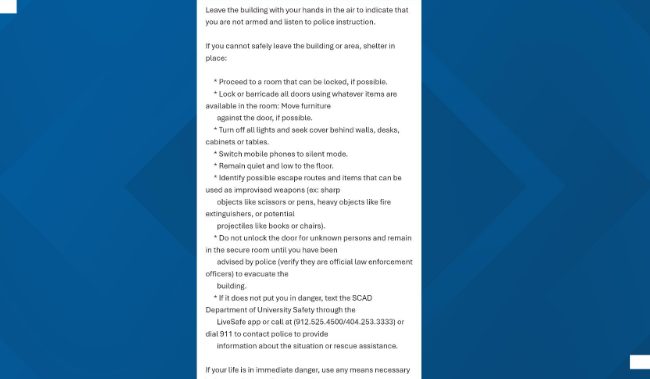ATLANTA, GA — On Tuesday, a mistaken active shooter alert sent waves of fear and confusion across the Savannah College of Art and Design’s (SCAD) Atlanta campus. The erroneous notification, which warned students and faculty of an active shooter threat, was issued via the school’s emergency alert system in the late morning hours, causing widespread panic and prompting lockdowns, frantic messages, and emergency calls throughout the university community.
The message, which read “ACTIVE SHOOTER ON CAMPUS — TAKE SHELTER IMMEDIATELY,” was disseminated through SCAD’s official alert channels, including text, email, and campus loudspeakers. Within moments, classrooms were barricaded, students hid under desks, and faculty members ushered people into secure rooms. Videos posted to social media showed scenes of confusion and fear, with students crying and calling loved ones, believing their lives were in danger.
However, within approximately 10 minutes, a follow-up message clarified that the initial alert had been sent in error. “PLEASE DISREGARD PREVIOUS MESSAGE. THERE IS NO THREAT TO CAMPUS SAFETY,” the second notification read. Despite the swift retraction, the emotional toll of the false alarm had already made a deep impact.
“I was in class when we got the alert, and people started screaming and running,” said Maya Thompson, a second-year illustration major. “We pushed desks against the doors and turned off the lights. I texted my mom to say goodbye. It was terrifying.”
According to SCAD officials, the false alarm was the result of a system malfunction during a routine test of the emergency alert infrastructure. “We sincerely apologize for the distress this alert caused,” said Dr. Andrée LeSure, Vice President of Student Affairs at SCAD, during a press briefing. “The alert was mistakenly triggered during a scheduled system check. We are actively investigating how this happened and are taking steps to ensure it never occurs again.”
The Atlanta Police Department was notified immediately upon issuance of the alert and dispatched officers to the campus as a precautionary measure. Officers arrived to find a locked-down, yet peaceful scene. After a comprehensive sweep of the premises, they confirmed there was no active threat. Police spokesperson Officer Elijah Rayburn said, “While we are relieved that this was a false alarm, we treat every report seriously. Our primary concern is always the safety of the students and faculty.”
The incident has raised questions about the reliability and sensitivity of emergency alert systems in educational institutions. Many SCAD students and parents expressed concern over the psychological effects of such an event. Some students reported lingering anxiety and emotional distress following the ordeal.
“I’ve never experienced anything like that,” said Jamal Reed, a first-year animation student. “Even after we found out it was a mistake, my heart was still racing hours later. I don’t know how you just shake that off.”
In response, SCAD has announced plans to offer mental health support for students and staff affected by the incident. Counseling services will be available on an extended basis this week, and the school will host a campus-wide forum to address concerns and gather feedback on improving campus communication and crisis protocols.
This incident is part of a troubling trend of false alarms at educational institutions across the country, where the fear of mass shootings has heightened sensitivity to potential threats. While preparedness is essential, experts say false alerts can do real harm and erode trust in emergency systems.
“This is a wake-up call,” said Dr. Lindsay Marsh, an expert in emergency communication at Georgia State University. “Institutions must ensure their alert systems are both robust and secure against accidental triggers. The consequences of a false alarm can be far-reaching—psychologically and operationally.”
Despite the shock of Tuesday’s events, many in the SCAD community are praising the swift response of both students and security personnel. “The fact that everyone took it seriously and acted quickly is a testament to our preparedness,” said security officer James Holloway. “In a real emergency, every second counts.”
Still, for many, the emotional scars may take time to heal. As SCAD officials continue their investigation and reassess their emergency alert protocols, students like Maya Thompson hope that the incident will lead to meaningful changes.
“I don’t want to go through something like that again,” she said. “I just want to feel safe at school.”
Would you like this content formatted for a press release, blog post, or newsletter as well?

